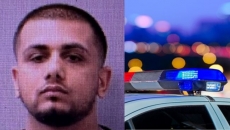Ceremonies, marches and other gatherings are taking place across the country Friday as communities mark the National Day of Truth and Reconciliation.
The federal statutory holiday, also known as Orange Shirt Day, was established last year to remember children who died while being forced to attend residential schools, as well as those who survived, and the families and communities still affected by lasting trauma.
Prime Minister Justin Trudeau joined representatives of various First Nations and dozens of people in orange for a sunrise ceremony in Niagara Falls, Ont. He stood silently as the ceremony took place and spoke with residential school survivors afterwards.
The National Day for Truth and Reconciliation ceremony is underway in Ottawa. Join us as we reflect on what this day means – and on how each of us has a role to play on the journey toward reconciliation: https://t.co/ch7NYd6wIG
— Justin Trudeau (@JustinTrudeau) September 30, 2022
Later in the morning, Trudeau addressed an event to mark the day.
"This is a day for Indigenous peoples. Today to recognize that yes, you are still here, you are still strong and you are an indissociable part of the present and the future we build everyday as a country," he told the crowd.
"It is a day to remember, to grieve, to take another step along healing. But it is also a day for non-Indigenous peoples to recognize that you should not have to carry this burden alone."
Trudeau said the day was about truth.
"That truth is we all need to open our eyes to the truth of how Canada evolved and came to be and how we need to make deliberate choices to undo the falsehoods and the wrongness that is part of it," he said.
"We are on the path, and it is going to take many years, but we must today and every day rededicate our selves to that."
In Ottawa, Gov. Gen. Mary Simon – the first Indigenous person to hold the post – welcomed nearly 100 school children and staff to Rideau Hall, where she spoke to them about reconciliation.
She said people wear orange shirts to show that every child matters, which is important to do because of how traumatic residential schools were to Indigenous children.
Simon told the children she grew up speaking Inuktitut.
"I still speak my language everyday," she said, adding she doesn't want to forget it.
Simon, who is 75, said at her age she’s learning a new language, French, and told the kids it would be good if they could a learn an Indigenous word every day. She then went on to teach them one in Inuktitut, which means to never give up.
Simon also talked to the children about persevering through hard things and tied it back to her own history, having grown up in a small isolated village and now working at Rideau Hall as the Governor General.
"It wasn't handed to me," she said.
In Toronto, a group drummed and sang Indigenous songs as a woman in traditional Indigenous attire danced at a gathering at the city's downtown Nathan Phillips Square.
Several dozen onlookers, some wearing orange shirts, occasionally cheered and clapped during the performance. One of the drummers said they were performing for both survivors of residential schools and those who didn't make it home.
In the centre of Halifax’s downtown, hundreds gathered to mark the day and hear from Acadia First Nation Chief Deborah Robinson, Mi’kmaw elder Alan Knockwood and Halifax’s Indigneous advisor Cheryl Copage-Gehue.
Knockwood told the crowd at the city’s Grand Parade that as the community comes together to reflect on Canada’s legacy of colonialism, the children lost in the residential school system are "here in our hearts and they are with us here."
He led a prayer in English and in Mi’kmaw.
"My language is still alive but residential school survivors like myself have a difficult time speaking it because it was beaten out of me. But I’m still here," Knockwood said. "Survivors from residential schools are part of you, and now our legacy is that it will never happen again and that’s because all of you here will not allow it to happen again."
Robinson told the crowd that she hopes everyone reflects on truth and reconciliation in their own way as they remember the suffering caused by residential schools.
While there has been progress towards supporting Indigenous people, Robinson said “it’s hard to deny, and I say this every year when I speak, that we have so far to go.”
The chief raised an orange flag created by a Nova Scotian Mi’kmaw artist with the Mi’kmaw petroglyph that represents a child.
While many of Nova Scotia’s planned events for the occasion have been postponed due to the damage from post-tropical storm Fiona, there will be a ceremony Friday at the site of the former Shubenacadie Indian Residential School and a light show in the evening at the old Halifax Memorial Library
Some of the other events scheduled today include the illumination of the Peace Tower on Parliament Hill in orange, programming about residential schools at the Winnipeg Art Gallery and a community powwow at the Victoria-area Songhees Nation.
The National Day of Truth and Reconciliation was declared after hundreds of potential unmarked burial sites of Indigenous children were found by First Nations near former residential schools, including by the Tk’emlúps te Secwepemc nation in Kamloops, B.C., and Saskatchewan's Cowessess First Nation.
Canada's residential school system, funded by the federal government and run by Catholic churches was established in the 1800s. It removed roughly 150,000 First Nations, Inuit and Metis children from their families. The last school closed in 1997.
Many children were sexually, physically or psychologically abused in the system designed to get the Indian out of the child.






